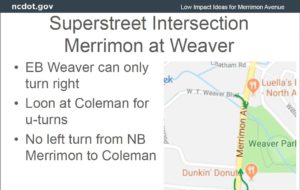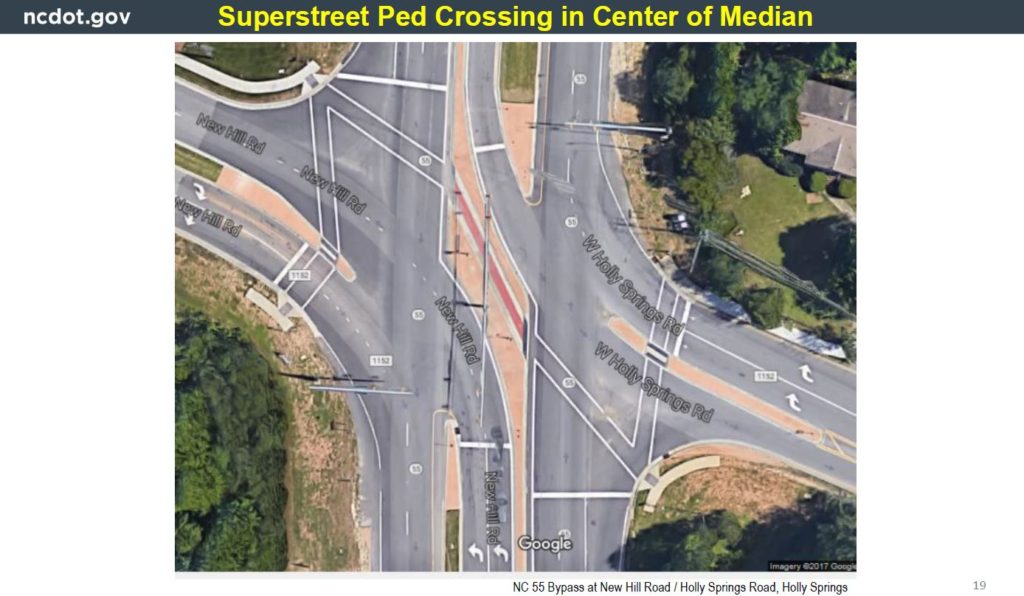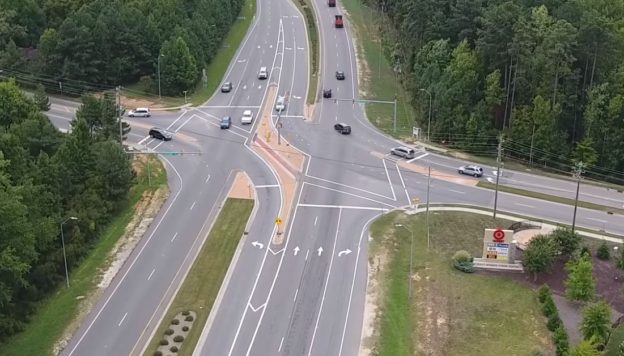The licensed professional engineers at the North Carolina Department of Transportation are frustrated that people are rejecting their lust for plowing high-speed superstreets, continuous flow intersections, and other land-gobbling motorist level of service innovations through their neighborhoods.
An internal research proposal supplied by one of my NCDOT friends on the inside reveals the agency’s Traffic Management Unit wants to research a way to educate cities into submission on these engineering practices that are incompatible with everything that makes cities thrive.
A research proposal drafted by NCDOT in August 2019 is aimed at producing “a set of materials that the NCDOT can use during project planning and design stages to convince town officials, landowners, media, and the general public that an innovative corridor or intersection design can be compatible with, indeed be essential to, a great urban place.”
You can access a full copy of NCDOT’s proposal at this link. If you’re not familiar with the engineering tactics the people are rejecting, here is a video from NCDOT describing one of their beloved innovations–a Superstreet.
NCDOT’s research proposal “Problem” statement starts:
NCDOT is having some success installing superstreets (aka, RCUTs, RCIs, etc.), continuous flow intersections, and quadrant intersections in rural and exurban areas, where the safety and operational benefits have been substantial. However, the Department has met fierce resistance from town officials, landowners, media, and citizens when we have proposed one of those innovative intersection designs in an urban area or an area that is becoming urban.
I just threw up in my mouth.
Part of NCDOT’s frustration may stem from their attempts to obliterate the Merrimon Avenue corridor in the City of Asheville. After citizens and elected officials came out in early 2018 against a motorist level of service project that gave only table scraps to people who walk and bike, NCDOT responded by doing what? Oh, yeah, they proposed a Superstreet as an option.
In a March, 2018, presentation titled, “Low Impact Ideas for Merrimon Avenue,” NCDOT’s licensed professional engineers actually posed a Superstreet as an option (see graphic below right). Re-watch that video and tell me how that aligns with low impact to an urban street.
Robert Moses would be proud.

I had experience dealing with NCDOT’s super lust for superstreets when working on a Comprehensive Pedestrian Plan for the Town of Granite Falls in 2011. Town officials were horrified that NCDOT wanted to turn a grade-separated interchange at Falls Avenue on Highway 321 into a surface-level superstreet intersection. (It inspired me to write a parody song about Superstreets to the tune of Rick James’ Superfreak. Turn it up loud and enjoy!)
The Falls Avenue interchange isn’t a pedestrian panacea. But it isn’t bad for what it is and when it was built. It’s two-lanes wide with stop-controlled off-ramps. There are sidewalks on both sides, which is more than what NCDOT has built on most interchanges in the decades since building this one. Today, it takes a pedestrians less than a minute to walk across it.

Granite Falls officials were right to be concerned with NCDOT’s proposal, as our analysis elsewhere in the state revealed disturbing treatments for people outside of cars at their new, innovative intersections.
NCDOT didn’t have many Superstreet concepts in place at that time, but NC 54 in Chapel Hill had treatments where pedestrian movements through a crossing were nearly the same as what they proposed on Superstreets.
We evaluated the crossing of NC 54’s median u-turn intersection, crossed it more than 20 times on foot at different times of the day, and came up with an estimate that a superstreet intersection could increase that pedestrian crossing time from 30-40 seconds to 4 minutes and 20 seconds.
This included an average dwell time in the median of two minutes, all while flanked by loud, high speed traffic, as shown in the video below.
It’s amazing how engineers fail to consider the quality of a pedestrian’s experience in navigating their concoctions. I’m convinced that the entirety of NCDOT’s thought process when it comes to Superstreets is believing all that matters to pedestrians is not being killed in a conventional way.
Below is a slide from NCDOT’s Congestion Management Engineer’s 2017 presentation to educate the Board of Transportation on Superstreets. (Aside: Do you really expect people who walk and bike to trust their safety to someone whose title is “Congestion Management Engineer”? What about that title suggests safety is their top priority?)

You can see it’s an old engineering tactic: Make pedestrians cross three streets in order to cross one street, then tell them it’s in their best interest to take 4 minutes to navigate this monstrosity while motorists enjoy uninhibited progression of signals from a mile or so away. Then they’ll blame pedestrian pedestrians for ignoring their engineering tactics when they don’t want to wait that long.
Cities rejecting this engineering are too much for NCDOT’s sensibilities, apparently, as their research proposal notes, “The results of not choosing an innovative design in a developing urban area are obvious and disheartening.”
Boo hoo.
It gets sappier.
The Congestion Management Engineer’s slide on “Superstreet Advantages” went as far as to say this engineering equates to “superior pedestrian service.” That claim even has its own bullet with an extra blank line between it and the other claims.
To closeout the research proposal, NCDOT is looking to hire some superior folks to help them sell this: “Proposing teams should…include, or be led by, professionals with skills in urban placemaking.”
With any luck, Janett Sadik-Khan and Jeff Speck will go after it.
Consider yourself educated.






